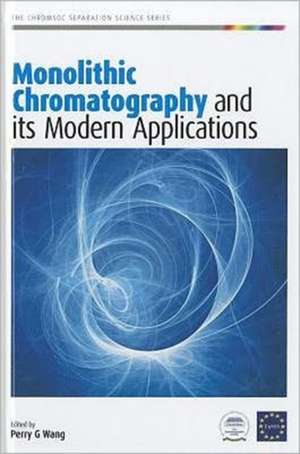Monolithic Chromatography and Its Modern Applications: Chromsoc Separation Science
Autor Perry G. Wangen Limba Engleză Hardback – oct 2010
Preț: 1226.53 lei
Preț vechi: 1714.31 lei
-28% Nou
Puncte Express: 1840
Preț estimativ în valută:
234.77€ • 255.10$ • 197.33£
234.77€ • 255.10$ • 197.33£
Carte indisponibilă temporar
Doresc să fiu notificat când acest titlu va fi disponibil:
Se trimite...
Preluare comenzi: 021 569.72.76
Specificații
ISBN-13: 9781906799038
ISBN-10: 1906799032
Pagini: 620
Dimensiuni: 160 x 234 x 33 mm
Greutate: 1.27 kg
Editura: ILM PUBN
Colecția Chromsoc Separation Science
Seria Chromsoc Separation Science
ISBN-10: 1906799032
Pagini: 620
Dimensiuni: 160 x 234 x 33 mm
Greutate: 1.27 kg
Editura: ILM PUBN
Colecția Chromsoc Separation Science
Seria Chromsoc Separation Science
Notă biografică
Dr. Perry G. Wang received his BS degree in chemistry from Shandong University, China. He earned his MS and PhD degrees in environmental engineering from Oregon State University, USA. He is currently a Research Chemist in the Office of Regulatory Science, Center for Food Safety and Applied Nutrition, US Food and Drug Administration (US FDA). His activities include analytical method development and validation for drugs and constituents in foods and cosmetic products using advanced instrumentation. His expertise focuses on high-throughput drug analysis by LC/MS/MS for the pharmaceutical industry. Dr. Wang has been invited to prepare, organise and preside over symposia for the Pittsburg Conference (PittCon) and American Chemistry Society (ACS) Annual Meetings. He has been an invited speaker at numerous international conferences including PittCon, the Federation of Analytical Chemistry and Spectroscopy Societies (FACSS) Meetings, the Beijing Conference and Exhibition on Instrumental Analysis (BCEIA) and the International Symposium on Chemical Biology and Combinatorial Chemistry (ICCBCC). He also has been invited to teach short courses on high-throughput method development for drug analysis by LC/MS/MS at PittCon, ACS Annual Meetings and the Eastern Analytical Symposium (EAS).
Cuprins
Part I Synthesis and Characterisation of Monolithic Columns Chapter 1 Affinity Monolith Chromatography: Principles and Recent Developments (Michelle J. Yoo and David S. Hage) Chapter 2 Characterisation of Pore Structure and Its Impact on the Chromatographic Properties of Organic Polymer Monolithic Capillary Columns (Pavel Jandera and Jiri Urban) Chapter 3 Silica-based Porous Monoliths: Synthesis, Characterisation and Applications in Chromatographic Separation (Hua Zhong and Qihua Yang) Chapter 4 Preparation and Characterisation of Organic Polymer Monolithic Capillary Columns (Pavel Coufal, Zuzana Bosakova, Jakub Sirc, Vera Pacakova and Karel Stulik) Chapter 5 Ring-opening Metathesis Polymerisation- derived Capillary Monoliths: Versatile Analytical Tools for Modern Biomedical Research (Frank M. Sinner and Christina Gatschelhofer) Chapter 6 Monolithic Cryogel Beds Prepared Under Varying Freezing Temperatures and Their Application in the Isolation of Nucleotides (Kejian Yao, Junxian Yun and Shaochuan Shen) Chapter 7 Organic Monoliths as Stationary Phases in Chromatography (Andreas Greiderer, S. Clark Ligon Jr., Christian W. Huck and Gunther K. Bonn) Part II Applications of Monolithic Columns Chapter 8 Applications of Monolithic Chromatography in Pharmaceutical Analysis (Debby Mangelings and Yvan Vander Heyden) Chapter 9 Monolithic Columns in Microscale Separations (Ren'an Wu and Hanfa Zou) Chapter 10 Monolithic Ion Exchange Phases for the Separation of Small Inorganic and Organic Ions (Brett Paull and Damian Connolly) Chapter 11 Monolithic Column Chromatography Coupled with Chemiluminescence Detection (Paul S. Francis and Jacqui L. Adcock) Chapter 12 Fast Separations of Phytochemicals by High-performance Liquid Chromatography Using Monolithic Columns (Mauricio A. Rostagno and Ana Villares) Chapter 13 Monolithic Stationary Phases for Affinity-based Separations (Panagiotis Manesiotis and Georgios Theodoridis) Chapter 14 Immobilisation of Enzymes on Monolithic Matrices: Applications in Drug Discovery (Vincenza Andrisano and Manuela Bartolini) Chapter 15 Applications of Monolithic Chromatography in Support of Pharmaceutical Development of Drug Substances and Formulations (Naijun Wu and Zhong Li) Chapter 16 Use of Monolithic Material as On-line Extraction Support for High-throughput Liquid Chromatography Tandem Mass Spectrometry Analysis of Biological Samples (Raymond Naxing Xu, Grace E. Kim, Maria P. Metchkarova, Phillip Vaca, Matthew J. Rieser and Tawakol A. El-Shourbagy) Chapter 17 Convective Interaction Media Monoliths for Separation and Purification of pDNA and Viruses (Matjaz Peterka, Petra Kramberger and Ales Strancar) Chapter 18 Analysis of Methylated Arginines and Amino Acids Using a Monolithic Silica Column (Makoto Tsunoda) Chapter 19 Applications of Monolithic Columns in the Analysis of Illicit Drug Samples (Kim McFadden and Brian Carney) Chapter 20 Applications of Monolithic Phases in Fundamental Studies of Vegetable Proteins and Food Analysis and Technology (J.M. Saz and M.L. Marina) Chapter 21 Toxicological Analysis Using Monolithic Silica Spin-column Extraction and Chromatographic Separations (Takeshi Saito, Akira Namera and Akihiro Nakamoto) Chapter 22 Amphiphilic Acrylamide-based Continuous Beds in Capillary Electrochromatography (Olga Kornysova, Audrius Maruska and Ute Pyell) Index
Recenzii
I found this book to be an excellent reference for monolithic chromatography, well organized and presented in an easy to understand style. I would strongly recommend the book to all analytical laboratories thinking of improving their separation protocols. Review by Sanjay Garg, University of Auckland, New Zealand, in Bioanalysis, 2011, 3: 5 [This book] serves as an introductory reader that is likely to inspire both seasoned scientists already working with monoliths and novices who want to encounter them for the first time and see how they can be applied in their work. Thus, this book could be a helpful resource for scientists and practitioners engaged in analytical chemistry and related fields. Review by F. Svec, Lawrence Berkeley National Laboratory, USA, in Analytical and Bioanalytical Chemistry, 2011, 401: 5
